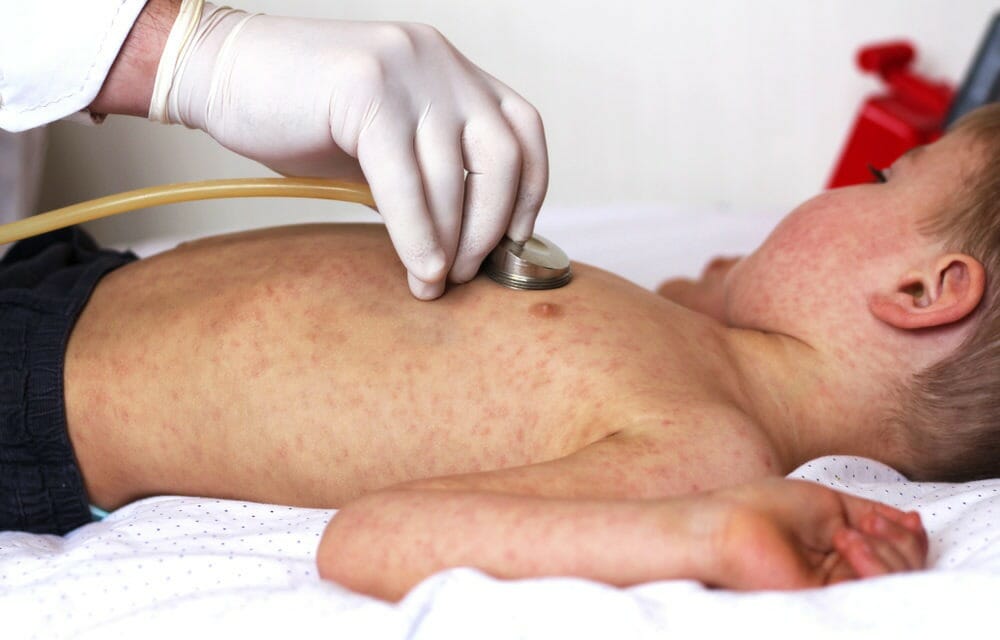Nearly two decades years after measles were declared eliminated from this country, outbreaks in more than 20 states in the country are being reported.
“We’re very concerned about the recent troubling rise in cases of measles, which was declared eliminated from our country in 2000,” Health and Human Services Secretary Alex Azard said during a press briefing on Monday, April 29.
As of April 29, the Centers for Disease Control and Prevention reported 704 cases of the disease from 22 states. This is the greatest number of cases reported in the U.S. since they were eliminated. While most parents are getting their children vaccinated, the vast majority of cases involve children who have not been vaccinated. Everyone should be vaccinated against the infectious viral disease and other vaccine-preventable diseases.

Dr. Shubha Kerkar
Reports of quarantines, national concern, and outbreaks can be unnerving. To clear up some questions, Uken Report turned to Dr. Shubha Kerkar. She is an Infectious Disease physician at Desert Regional Medical Center.
Following are the questions Uken Report posed and Kerkar’s responses.
Uken Report (UR): Measles are typically considered a childhood disease if we are not mistaken, correct?
Dr. Kerkar: Yes. Infants and children under 5 years of age are mostly affected. Pregnant women, people with compromised immune systems, such as leukemia and HIV infection can be also susceptible.
UR: Can they be deadly and what are the side effects?
Dr. Kerkar: Measles can be serious in all age groups. However, children younger than 5 years of age and adults older than 20 years of age are more likely to suffer from measles complications. Common measles complications include ear infections and diarrhea. Ear infections occur in about one out of every 10 children with measles and can result in permanent hearing loss. Diarrhea is reported in less than one out of 10 people with measles. Some people may suffer from severe complications, such as pneumonia (infection of the lungs) and encephalitis (swelling of the brain). They may need to be hospitalized and could die.
- As many as one out of every 20 children with measles gets pneumonia, the most common cause of death from measles in young children.
- About one child out of every 1,000 who get measles will develop encephalitis (swelling of the brain) that can lead to convulsions and can leave the child deaf or with intellectual disability.
- For every 1,000 children who get measles, one or two will die from it. Measles may cause pregnant woman to give birth prematurely, or have a low-birth-weight baby
UR: Who needs to get the vaccine?
Dr. Kerkar: CDC recommends routine childhood immunization for MMR vaccine, starting with the first dose at 12 – 15 months of age, and the second dose at 4 through 6 years of age or at least 28 days following the first dose.
Students at post-high school educational institutions without evidence of measles immunity need two doses of MMR vaccine, with the second dose administered no earlier than 28 days after the first dose.
International travelers 6 months of age or older who will be traveling internationally should be protected against measles, before traveling internationally. People who are born during or after 1957 who do not have evidence of immunity against measles.
UR: What if I had the vaccine when I was a child? Do I need to get it, again?
Dr. Kerkar: No. You can have your measles immunity verified by your doctor.
UR: How can someone tell if he or she has had the vaccine?
Dr. Kerkar: You can have your measles immunity verified by your doctor.
UR: What if I have been exposed to someone with the infectious disease?
Dr. Kerkar: If you are immune/vaccinated — you will not get the measles infection even if you get exposed.
UR: What did we miss that is paramount to address?
Dr. Kerkar: The majority of people who got measles were unvaccinated. Measles is still common in many parts of the world including some countries in Europe, Asia, the Pacific, and Africa. Travelers with measles continue to bring the disease into the U.S. Measles can spread when it reaches a community in the U.S. where groups of people are unvaccinated. Parents have the responsibility to protect their children from measles and other vaccine-preventable disease.
Image Sources
- Dr. Kerkar: Desert Regional Medical Center
- Child infected with measles: Shutterstock




![Enrolling Now, Rewarding Careers Ahead [Sponsored]](https://ukenreport.com/wp-content/uploads/2024/04/COD_heroes_1-1385-2-440x264.jpg)


